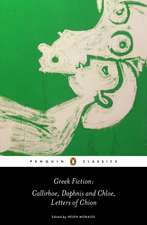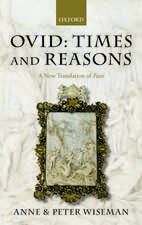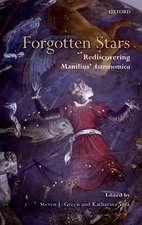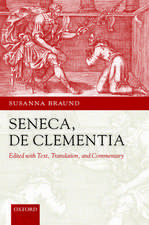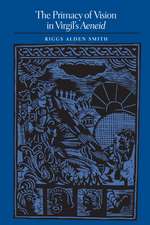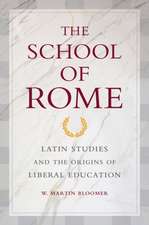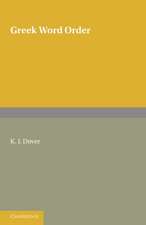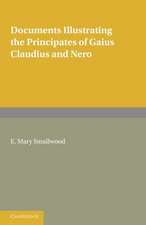Echoing Hylas: A Study in Hellenistic and Roman Metapoetics: Wisconsin Studies in Classics
Autor Mark Heerinken Limba Engleză Hardback – 14 dec 2015
During a stopover of the Argo in Mysia, the boy Hylas sets out to fetch water for his companion Hercules. Wandering into the woods, he arrives at a secluded spring, inhabited by nymphs who fall in love with him and pull him into the water. Mad with worry, Hercules stays in Mysia to look for the boy, but he will never find him again . . .
In Echoing Hylas, Mark Heerink argues that the story of Hylas—a famous episode of the Argonauts' voyage—was used by poets throughout classical antiquity to reflect symbolically on the position of their poetry in the literary tradition. Certain elements of the story, including the characters of Hylas and Hercules themselves, functioned as metaphors of the art of poetry. In the Hellenistic age, for example, the poet Theocritus employed Hylas as an emblem of his innovative
bucolic verse, contrasting the boy with Hercules, who symbolized an older, heroic-epic tradition. The Roman poet Propertius further developed and transformed Theocritus's metapoetical allegory by turning Heracles into an elegiac lover in pursuit of an unattainable object of affection. In this way, the myth of Hylas became the subject of a dialogue among poets across time, from the Hellenistic age to the Flavian era. Each poet, Heerink demonstrates, used elements of the myth to claim his own place in a developing literary tradition.
With this innovative diachronic approach, Heerink opens a new dimension of ancient metapoetics and offers many insights into the works of Apollonius of Rhodes, Theocritus, Virgil, Ovid, Valerius Flaccus, and Statius.
In Echoing Hylas, Mark Heerink argues that the story of Hylas—a famous episode of the Argonauts' voyage—was used by poets throughout classical antiquity to reflect symbolically on the position of their poetry in the literary tradition. Certain elements of the story, including the characters of Hylas and Hercules themselves, functioned as metaphors of the art of poetry. In the Hellenistic age, for example, the poet Theocritus employed Hylas as an emblem of his innovative
bucolic verse, contrasting the boy with Hercules, who symbolized an older, heroic-epic tradition. The Roman poet Propertius further developed and transformed Theocritus's metapoetical allegory by turning Heracles into an elegiac lover in pursuit of an unattainable object of affection. In this way, the myth of Hylas became the subject of a dialogue among poets across time, from the Hellenistic age to the Flavian era. Each poet, Heerink demonstrates, used elements of the myth to claim his own place in a developing literary tradition.
With this innovative diachronic approach, Heerink opens a new dimension of ancient metapoetics and offers many insights into the works of Apollonius of Rhodes, Theocritus, Virgil, Ovid, Valerius Flaccus, and Statius.
Din seria Wisconsin Studies in Classics
-
 Preț: 71.93 lei
Preț: 71.93 lei -
 Preț: 357.07 lei
Preț: 357.07 lei -
 Preț: 160.09 lei
Preț: 160.09 lei -
 Preț: 321.58 lei
Preț: 321.58 lei -
 Preț: 116.93 lei
Preț: 116.93 lei -
 Preț: 58.57 lei
Preț: 58.57 lei -
 Preț: 208.26 lei
Preț: 208.26 lei -
 Preț: 238.93 lei
Preț: 238.93 lei -
 Preț: 322.99 lei
Preț: 322.99 lei -
 Preț: 403.33 lei
Preț: 403.33 lei -
 Preț: 149.95 lei
Preț: 149.95 lei -
 Preț: 66.23 lei
Preț: 66.23 lei -
 Preț: 118.67 lei
Preț: 118.67 lei -
 Preț: 306.60 lei
Preț: 306.60 lei -
 Preț: 229.03 lei
Preț: 229.03 lei -
 Preț: 310.57 lei
Preț: 310.57 lei -
 Preț: 336.39 lei
Preț: 336.39 lei -
 Preț: 258.86 lei
Preț: 258.86 lei -
 Preț: 153.95 lei
Preț: 153.95 lei -
 Preț: 428.40 lei
Preț: 428.40 lei -
 Preț: 429.75 lei
Preț: 429.75 lei -
 Preț: 227.80 lei
Preț: 227.80 lei - 15%
 Preț: 478.78 lei
Preț: 478.78 lei -
 Preț: 247.73 lei
Preț: 247.73 lei -
 Preț: 402.76 lei
Preț: 402.76 lei - 15%
 Preț: 476.54 lei
Preț: 476.54 lei -
 Preț: 178.13 lei
Preț: 178.13 lei -
 Preț: 257.29 lei
Preț: 257.29 lei -
 Preț: 119.03 lei
Preț: 119.03 lei -
 Preț: 166.72 lei
Preț: 166.72 lei -
 Preț: 187.37 lei
Preț: 187.37 lei -
 Preț: 199.67 lei
Preț: 199.67 lei -
 Preț: 218.12 lei
Preț: 218.12 lei - 23%
 Preț: 608.98 lei
Preț: 608.98 lei - 23%
 Preț: 589.87 lei
Preț: 589.87 lei -
 Preț: 347.37 lei
Preț: 347.37 lei -
 Preț: 305.89 lei
Preț: 305.89 lei -
 Preț: 122.89 lei
Preț: 122.89 lei -
 Preț: 177.37 lei
Preț: 177.37 lei - 23%
 Preț: 591.20 lei
Preț: 591.20 lei -
 Preț: 160.48 lei
Preț: 160.48 lei -
 Preț: 258.14 lei
Preț: 258.14 lei -
 Preț: 258.25 lei
Preț: 258.25 lei - 23%
 Preț: 450.63 lei
Preț: 450.63 lei - 23%
 Preț: 709.57 lei
Preț: 709.57 lei -
 Preț: 502.03 lei
Preț: 502.03 lei -
 Preț: 246.80 lei
Preț: 246.80 lei
Preț: 506.04 lei
Nou
Puncte Express: 759
Preț estimativ în valută:
96.83€ • 101.10$ • 80.14£
96.83€ • 101.10$ • 80.14£
Carte tipărită la comandă
Livrare economică 05-19 aprilie
Preluare comenzi: 021 569.72.76
Specificații
ISBN-13: 9780299305406
ISBN-10: 0299305406
Pagini: 264
Dimensiuni: 152 x 229 x 20 mm
Greutate: 0.5 kg
Ediția:1
Editura: University of Wisconsin Press
Colecția University of Wisconsin Press
Seria Wisconsin Studies in Classics
ISBN-10: 0299305406
Pagini: 264
Dimensiuni: 152 x 229 x 20 mm
Greutate: 0.5 kg
Ediția:1
Editura: University of Wisconsin Press
Colecția University of Wisconsin Press
Seria Wisconsin Studies in Classics
Recenzii
"Every reader will welcome a systematic appreciation of the ways Greek and Roman poets of different genres used the motif of Hercules and Hylas to highlight the primacy of poetics sharing the same post-Callimachean awareness that reality—even fictional reality—is more complicated and nuanced than the battlefield of the Homeric heroes."—Marco Fantuzzi, Columbia University and the University of Macerata
"Scholars of literature in both Greek and Latin will find that it opens up many avenues of fruitful research, particularly with regard to the potential metapoetic nuances of myths within poetry. The language is very clear and the book is excellently presented." —Bryn Mawr Classical Review
"Clarifies the workings of metapoetics in classical antiquity, offering stimulating reflections on the intertextual dialogue among poets living in very different contexts, from the Hellenistic Age to the Flavian era." —Classical Review
Notă biografică
Mark Heerink is an associate professor in Latin literature at the University of Amsterdam and VU University Amsterdam. He is the author of Brill's Companion to Valerius Flaccus.
Cuprins
Acknowledgments
Abbreviations
Introduction
1 The Dilemma of Libertas in Epistles 1.1
2 Horace the Student: Inconsistency and Sickness in Epistles 1.1, 1.8, and 1.15
3 Horace the Teacher: Poetry and Philosophy in Epistles 1.1 and 1.2
4 Nil Admirari: The Moral Adviser of Epistles 1.4, 1.5, 1.6, and 1.12
5 Otia Liberrima: Horace, Maecenas, and the Sabine Farm in Epistles 1.7 and 1.16
6 The Limits of Rural Libertas: Epistles 1.10, 1.11, and 1.14
7 Moderate Freedom and Friendship: Epistles 1.17 and 1.18
8 Moderate Freedom and Poetry: Epistles 1.3 and 1.19
Conclusion: Freedom and Publication in Epistles 1.13 and 1.20
Notes
Bibliography
Index
Abbreviations
Introduction
1 The Dilemma of Libertas in Epistles 1.1
2 Horace the Student: Inconsistency and Sickness in Epistles 1.1, 1.8, and 1.15
3 Horace the Teacher: Poetry and Philosophy in Epistles 1.1 and 1.2
4 Nil Admirari: The Moral Adviser of Epistles 1.4, 1.5, 1.6, and 1.12
5 Otia Liberrima: Horace, Maecenas, and the Sabine Farm in Epistles 1.7 and 1.16
6 The Limits of Rural Libertas: Epistles 1.10, 1.11, and 1.14
7 Moderate Freedom and Friendship: Epistles 1.17 and 1.18
8 Moderate Freedom and Poetry: Epistles 1.3 and 1.19
Conclusion: Freedom and Publication in Epistles 1.13 and 1.20
Notes
Bibliography
Index
Descriere
This book argues that Greek and Roman poets throughout classical antiquity used the myth of the lost boy Hylas and the hero Hercules to reflect allegorically on their own poetry and its position in literary history, and thus offers a unique diachronic case study of ancient self-reflexive poetry.

